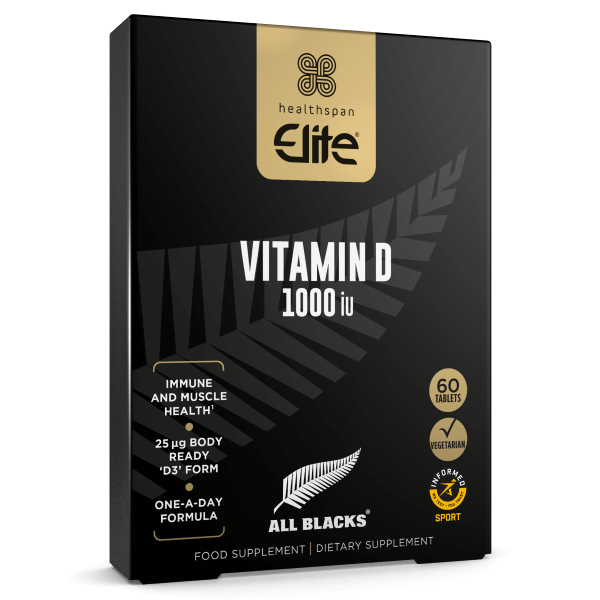As most vitamin D is made by the skin on contact with the sun, deficiency can be a problem in the winter, especially in northern latitudes. Nutritionist Rob Hobson explains why keeping your vitamin D levels up is important for sports performance.
Vitamin D has long been known to support muscles, bones and teeth, but recent research has revealed a much wider range of health benefits.
Research is growing, and vitamin D is now recognised by athletes for its role in supporting immunity and reducing the longevity of upper respiratory tract infections, as well as being integral to supporting performance through muscle function, strength, speed, body composition, mood and energy.
Immunity
It is widely understood that an association exists between vitamin D status and illness, and that those with a higher status have a lower incidence of respiratory infections.1
Research has highlighted the critical role of immunity in exercise, and it has been shown that those engaged in endurance sports are at a particularly increased risk of upper respiratory tract infections (URTI).
Research has also found that athletes with vitamin D levels above 120 nmol/l present significantly less often for the treatment of URTI, and that the severity and days of illness are lower than in those with deficiency (defined as levels lower than 30 nmol/l.)2
Exactly how vitamin D works within the immune system is not fully understood. However, studies have implied that vitamin D may be involved in the proliferation of T-cells, which can inhibit the expression of inflammatory cytokines (substances secreted by certain cells of the immune system).3
Performance
The active form of vitamin D (calcitriol) activates many metabolic processes in skeletal muscle tissue, such as stimulating protein synthesis. Calcitriol is also involved in the proliferation of muscle cells, while also playing a role in inhibiting their destruction.4
Vitamin D deficiency is associated with myopathy (muscle disease), including muscle weakness,5 which indicates a potential role for vitamin D in muscular function. It has also been shown that vitamin D deficiency is a contributor to non-specific musculoskeletal pain.
Deficiency can also lead to poor muscle tone and degradation of type 2 muscle fibres – those that generate faster muscle contraction and greater force.
The result of these effects is that they may impact muscle strength and power.6 Although supplementation may address the issue of deficiency, there is currently no evidence to link supplementation to improved muscle strength.7
Another measure of performance, particularly in endurance sport, is VO2 max: the rate at which the heart, lungs and muscle can effectively use oxygen during exercise. The relationship between vitamin D and VO2 max may be linked to lung function, and this could be related to performance, given that aerobic capacity (VO2 max) relies on the optimal function of the lungs.8
However, the exact mechanism linking vitamin D deficiency to reduced VO2 max remains unclear.

All Blacks Vitamin D 1000iu
The sunshine vitamin: an essential nutrient that supports your immune health and normal muscles and bones
- Supports your immune, muscle and bone health
- 1000iu (25mcg) of vitamin D3, the body-ready form
- One-a-day formulation, suitable for vegetarians
Mood
Vitamin D deficiency can cause symptoms such as fatigue, bone pain and muscle weakness, which all have the potential to negatively influence an athlete's mood.
Depression may also occur as a direct result of vitamin D deficiency. Low levels of vitamin D have been shown to increase the risk of bone fractures in athletes, putting them out of action for long periods of time, which in turn may impact an athlete's mood state.
Encouraging athletes to address their vitamin D status by way of sun exposure, diet, and supplements (essential during the winter months) can help limit the risk of deficiency-related symptoms or injury, and so contribute to a healthy mood state.
Sporting events can be psychologically stressful and may have a negative impact on an athlete's mood state, which in turn could influence their performance.
An interesting study of endurance athletes published in the journal Frontiers in Psychology showed that supplementing with vitamin D in the two weeks leading up to an event helped to address deficiency, and positively influenced mood and perceived stress beforehand, although the doses were particularly high (10,000 IU, or 250mcg, a day.)9
Energy
Nutritional deficiencies are not common in the UK, but of those that do occur, the most likely is vitamin D. A study of athletes from around the globe showed that 56% had insufficient levels of vitamin D, and that the UK presented with one of the highest rates of insufficiency.10
Symptoms of vitamin D deficiency particularly relevant to athletes include increased risk of acute illness, injury (stress fracture), muscle pain and muscle weakness.
Vitamin D deficiency can also affect mood by way of depression. All these symptoms have the potential to impact energy levels, which is why it is important for athletes to be aware of their vitamin D status.
Athletes at particular risk of deficiency include those who train indoors during the year, athletes with dark skin, and those living in higher latitudes such as the UK and northern Europe, where sunlight is not strong enough during the winter months to synthesise sufficient vitamin D.









